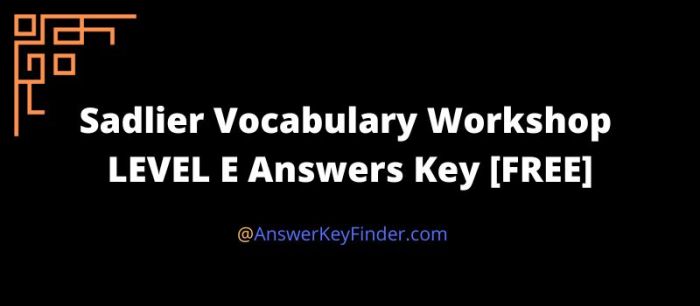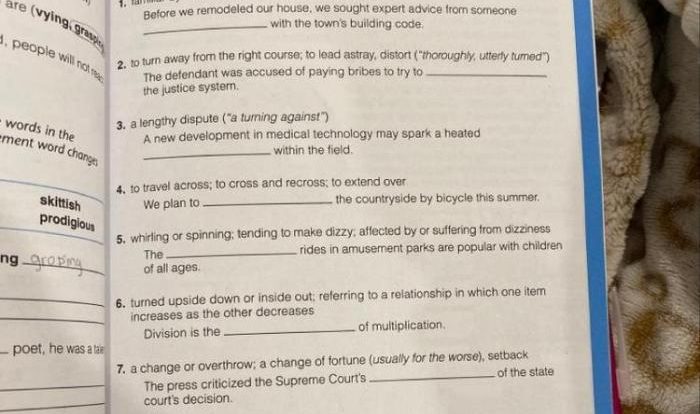Embark on a linguistic adventure with Vocabulary Workshop Level E Unit 10, a comprehensive exploration of vocabulary development, word analysis, context clues, and more. This unit empowers learners to unlock the intricacies of language, enriching their communication skills and expanding their understanding of the world around them.
Through engaging exercises and activities, Vocabulary Workshop Level E Unit 10 fosters a deep understanding of vocabulary, enabling learners to master new words, decode unfamiliar terms, and express themselves with precision and clarity.
Vocabulary Development

Vocabulary development is crucial in Unit 10 as it expands students’ ability to comprehend, communicate, and express themselves effectively. The unit includes a range of vocabulary exercises and activities, such as:
- Synonym and antonym identification
- Matching words to definitions
- Completing sentences with appropriate vocabulary
- Creating word maps and webs
Strategies for improving vocabulary retention include:
- Spaced repetition
- Active recall
- Contextualization
- Use of visual aids
Word Analysis
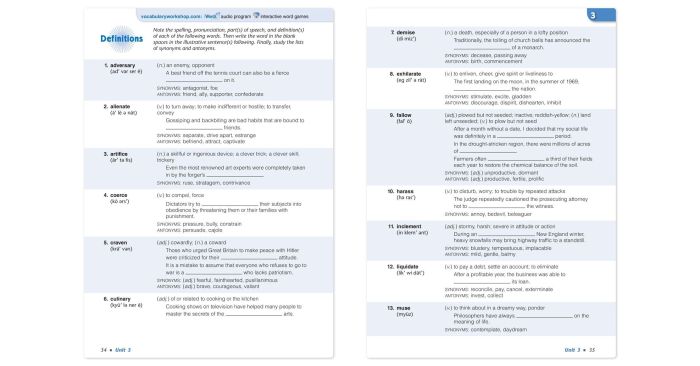
Unit 10 teaches students word analysis skills, which enable them to break down words into their component parts to determine their meaning. These skills include:
- Identifying root words, prefixes, and suffixes
- Understanding the meaning of word parts
- Using word analysis to decode unfamiliar words
Word analysis exercises and activities include:
- Matching root words to their meanings
- Identifying prefixes and suffixes in words
- Using word parts to create new words
- Analyzing the structure of unfamiliar words
Word analysis contributes to vocabulary development by providing students with a systematic approach to understanding the meaning of words and expanding their vocabulary.
Context Clues
Context clues are hints within a text that provide information about the meaning of unfamiliar words. Unit 10 emphasizes the importance of context clues in vocabulary acquisition.
Types of context clues include:
- Definition
- Example
- Contrast
- Restatement
Strategies for using context clues effectively include:
- Read the surrounding text carefully
- Identify key words and phrases
- Use synonyms and antonyms
- Make inferences
Root Words, Prefixes, and Suffixes
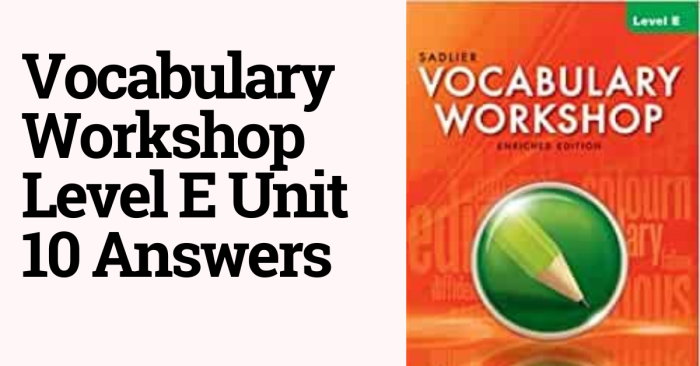
Root words, prefixes, and suffixes are essential elements of vocabulary expansion. Unit 10 introduces students to the role of these elements in understanding the meaning of words.
Exercises that focus on identifying and understanding these elements include:
- Identifying root words in words
- Matching prefixes and suffixes to their meanings
- Using root words, prefixes, and suffixes to create new words
- Analyzing the structure of unfamiliar words
This knowledge helps students decode unfamiliar words by providing them with a systematic approach to understanding the meaning of words.
Figurative Language
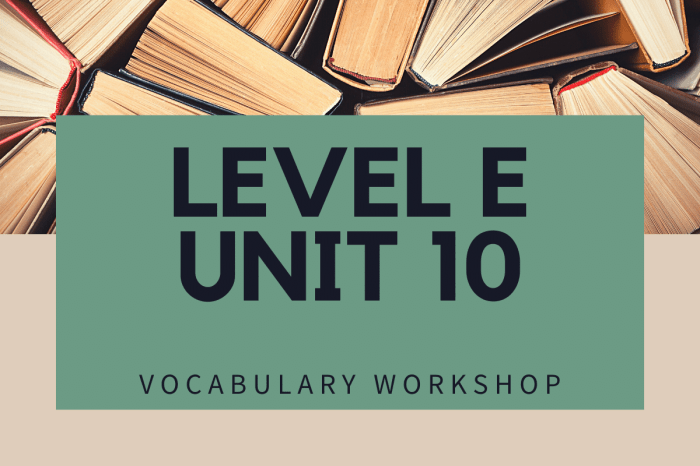
Unit 10 covers various types of figurative language, including:
- Similes
- Metaphors
- Personification
- Hyperbole
Figurative language exercises and activities include:
- Identifying figurative language in texts
- Interpreting the meaning of figurative language
- Using figurative language in writing and speaking
- Creating original figurative language
Figurative language enhances vocabulary and communication skills by providing students with a deeper understanding of the nuances and shades of meaning in language.
Vocabulary in Action: Vocabulary Workshop Level E Unit 10
Unit 10 encourages students to apply their vocabulary in meaningful contexts. Activities include:
- Writing essays and stories that incorporate new vocabulary
- Participating in discussions and debates that require the use of precise vocabulary
- Creating presentations that demonstrate understanding of vocabulary
- Engaging in role-playing activities that require the use of appropriate vocabulary
Real-world vocabulary application is crucial as it helps students develop fluency and confidence in using new words.
Key Questions Answered
What is the significance of vocabulary development in Unit 10?
Vocabulary development is crucial in Unit 10 as it lays the foundation for effective communication and critical thinking. Expanding vocabulary enables learners to express themselves more precisely, comprehend complex texts, and engage in meaningful discussions.
How does word analysis contribute to vocabulary development?
Word analysis provides learners with the tools to dissect words into their constituent parts, such as root words, prefixes, and suffixes. This knowledge empowers them to decode unfamiliar words, understand their meaning, and build a stronger vocabulary.
What are the different types of context clues covered in Unit 10?
Unit 10 explores various types of context clues, including definition, example, synonym, antonym, and inference. By recognizing and utilizing these clues, learners can effectively determine the meaning of unfamiliar words within a given context.
